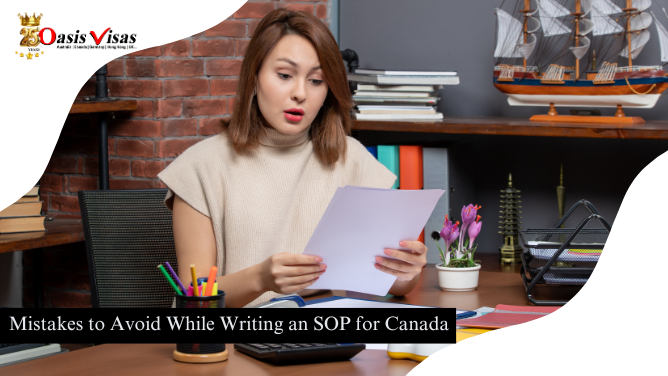
For those who have decided to pursue higher studies in Canada, one of the most important aspects of your application is the SOP for Canada; it is known as the Statement of Purpose, commonly referred to as the SOP. The SOP for Canada serves as a window into your personality, goals, and aspirations. It is your opportunity to tell the world why you are the ideal candidate for the program and how it fits into your future plans.
However, writing an effective SOP for Canada can be a daunting task, especially when small mistakes can cost you the opportunity to study in one of the most sought-after destinations for education. Many students unknowingly make errors that weaken their SOP, leading to rejections. To help you create a flawless document, this blog will highlight the common mistakes to avoid while writing an SOP for Canada, ensuring that you put your best foot forward and enhance your chances of acceptance.
Ignoring the Guidelines Provided by the University
The most common mistake students make while writing an SOP is not considering the guidelines provided by their selected university. Details like word count, font size, proper formatting, and a structured piece of content should be covered in the guidelines prescribed by universities. A lack of paying heed to them may make it seem like you are not attentive, which is not appealing enough for your application. Always read instructions carefully and stick to them while drafting your SOP.
Generic SOP Applied to Canada.
The biggest fault is using some generic SOP drafted for Canada on account of an applied program or the institution itself; otherwise, while doing so can seem to save ample time for preparation, it very much de-emphasizes an entire set statement. Admission authorities are in fact looking for potential candidates who appear to know thoroughly how their selected programme will meet requirements and facilitate its achievement. Customize your SOP for Canada with a reflection of why you have chosen that particular university and program.
Overloading the SOP with Academic Achievements
Although it is very important to highlight your academic achievements, overloading the SOP with grades, percentages, and awards would make it appear more like a resume than a personal statement. The admissions committee is more interested in your motivations, experiences, and future plans. While mentioning your academic credentials is essential, your SOP should maintain the balance by being focused on your personal journey and aspirations.
Formal but not Robot Writing
A Statement of Purpose should be formal, but it should not be robotic and dead. The worst mistake students make is overusing complex sentences and jargon to sound big and important. In fact, the best SOP for Canada would be one written in simple language, clear and engaging. The text must bring out your personality so that it sounds unique and relates to everyone.
Only Thinking of Yourself
Although it is mainly about you, the SOP should also indicate how your presence will add to the community of the university. Most students tend to talk only about their achievements and goals while forgetting to emphasize what they intend to contribute to the institution. Show your enthusiasm in becoming an active part of the university and talk about specific aspects of the program that excite you.
Taking Content from Sample SOP for Canada
In the digital age, it is very tempting to copy content from online samples of SOPs for Canada. Plagiarism can lead to the immediate rejection of your application. Admission committees are skilled at identifying copied content. Instead of taking shortcuts, invest time in creating an original SOP that reflects your unique journey and aspirations. Use samples only as a reference to understand the structure and tone.
Including Irrelevant Information
The most important thing in writing an effective SOP for Canada is knowing what to include and what to leave out. Many students make the mistake of including irrelevant details such as personal problems, unrelated hobbies, or family background unless they directly relate to your motivation to pursue the program. Keep your SOP concise and focused on your academic and professional journey.
Failure to Explain Gaps in Education or Career
If you have a gap in education or career, not filling up the gaps with your SOP can raise red flags for the admission committee. Never hide any gap and provide them with valid reasons that may be: to pursue some additional certifications, gain work experience, or dealing with personal matters. Explaining the gaps shows one is responsible and has a bright future plan.
Proofreading of the Document
Typos, grammatical errors, and spelling mistakes can give the reader a wrong impression. Submission of an SOP to Canada without thorough proofreading is one of the most common mistakes that can prove detrimental to the acceptance process. Always revise your SOP multiple times and consider taking suggestions from mentors, peers, or professional editors so that it is free of errors.
Omission of Strong Conclusion
The conclusion of your SOP for Canada is your final chance to make a lasting impression. Most students commit the error of ending the SOP abruptly or without summarizing the key points they want to highlight. A strong conclusion should summarize your goals, be grateful for the opportunity, and end on a positive and confident note.
Writing an SOP for Canada does require careful planning and attention to minute detail, hence with a comprehensive understanding of the expectation of what a university anticipates from students, you can avoid these typical errors and hence be able to pen down the perfect SOP about you and your expectations.
Remember your SOP is just a reflection of you and all you want in your life. Take your time to write an SOP for Canada that is not only thoughtful and personalized but also tells a story unique to you from the rest. With the right approach and effort, you can surely enhance your chances of studying in your dream institution in Canada.








